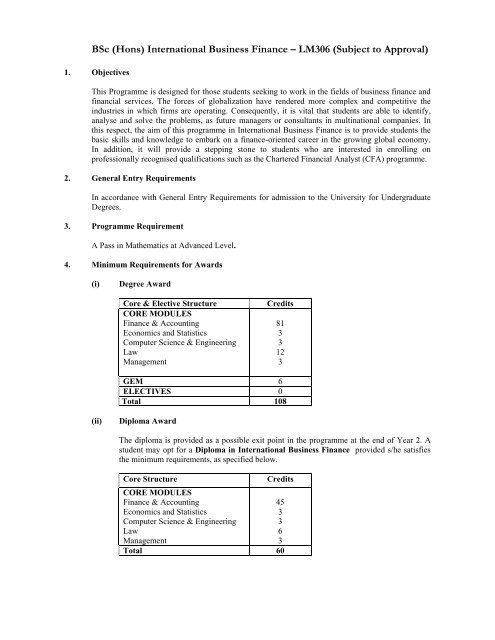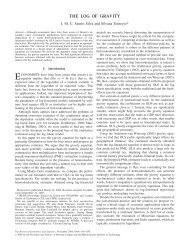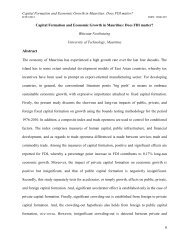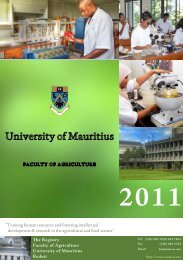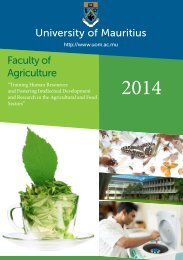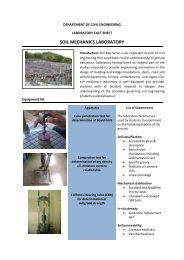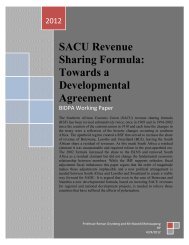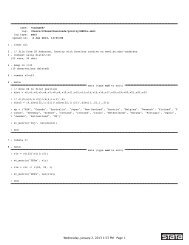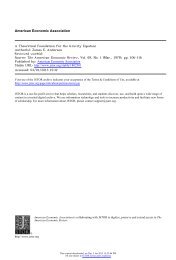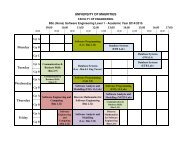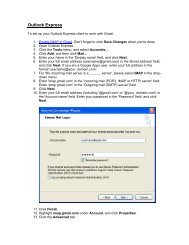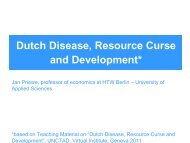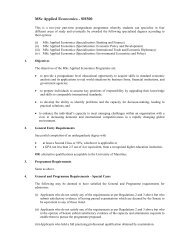BSc (Hons) International Business Finance - the University of Mauritius
BSc (Hons) International Business Finance - the University of Mauritius
BSc (Hons) International Business Finance - the University of Mauritius
You also want an ePaper? Increase the reach of your titles
YUMPU automatically turns print PDFs into web optimized ePapers that Google loves.
<strong>BSc</strong> (<strong>Hons</strong>) <strong>International</strong> <strong>Business</strong> <strong>Finance</strong> – LM306 (Subject to Approval)1. ObjectivesThis Programme is designed for those students seeking to work in <strong>the</strong> fields <strong>of</strong> business finance andfinancial services. The forces <strong>of</strong> globalization have rendered more complex and competitive <strong>the</strong>industries in which firms are operating. Consequently, it is vital that students are able to identify,analyse and solve <strong>the</strong> problems, as future managers or consultants in multinational companies. Inthis respect, <strong>the</strong> aim <strong>of</strong> this programme in <strong>International</strong> <strong>Business</strong> <strong>Finance</strong> is to provide students <strong>the</strong>basic skills and knowledge to embark on a finance-oriented career in <strong>the</strong> growing global economy.In addition, it will provide a stepping stone to students who are interested in enrolling onpr<strong>of</strong>essionally recognised qualifications such as <strong>the</strong> Chartered Financial Analyst (CFA) programme.2. General Entry RequirementsIn accordance with General Entry Requirements for admission to <strong>the</strong> <strong>University</strong> for UndergraduateDegrees.3. Programme RequirementA Pass in Ma<strong>the</strong>matics at Advanced Level.4. Minimum Requirements for Awards(i)Degree AwardCore & Elective StructureCORE MODULES<strong>Finance</strong> & AccountingEconomics and StatisticsComputer Science & EngineeringLawManagementCredits8133123GEM 6ELECTIVES 0Total 108(ii)Diploma AwardThe diploma is provided as a possible exit point in <strong>the</strong> programme at <strong>the</strong> end <strong>of</strong> Year 2. Astudent may opt for a Diploma in <strong>International</strong> <strong>Business</strong> <strong>Finance</strong> provided s/he satisfies<strong>the</strong> minimum requirements, as specified below.Core StructureCreditsCORE MODULES<strong>Finance</strong> & Accounting45Economics and Statistics3Computer Science & Engineering3Law6Management3Total 60
5. Programme DurationNormal MaximumDiploma: 2 years 3 yearsDegree: 3 years 5 years6. Credits per Year: Maximum 48 credits, Minimum 18 credits subject to Regulation 5.7. Minimum Credits Required for Degree Award: 108For <strong>the</strong> award <strong>of</strong> <strong>the</strong> <strong>BSc</strong> (<strong>Hons</strong>) <strong>International</strong> <strong>Business</strong> <strong>Finance</strong> Degree, <strong>the</strong> student must obtainat least 108 credits (see 4 above).8. AssessmentEach module will be assessed over 100 marks (i.e. expressed as %) with details as follows (unlesso<strong>the</strong>rwise specified):Assessment will be based on written examination (<strong>of</strong> 2 to 3-hour duration, as specified) andcontinuous assessment carrying a range <strong>of</strong> 20% to 30% <strong>of</strong> total marks including <strong>the</strong> followingmodules:Module Continuous Assessment WrittenExaminationDFA2222(3)– Research Methods for<strong>Finance</strong>DFA2034Y(3)-InvestmentSecurity AnalysisandDFA3012Y(5)– Options Strategiesand Financial Modelling30%(15% for class or lab-based testand 15% for individualassignment)30%(includes 15% for a class or labbasedtest)30%(includes 15% for a class or labbasedtest)70%70%70%Continuous assessment may be based on laboratory work and/or assignments and should include atleast one class test. For all modules taught in semester 1, <strong>the</strong>re will be a compulsory class test at <strong>the</strong>end <strong>of</strong> semester 1 <strong>of</strong> <strong>the</strong> given academic year unless stated o<strong>the</strong>rwise in <strong>the</strong> Programme Structure.This is applicable to modules examined at <strong>the</strong> end <strong>of</strong> <strong>the</strong> academic year.For a student to pass a module, an overall total <strong>of</strong> 40% for combined continuous assessment andwritten examination components would be required without minimum thresholds within <strong>the</strong>individual continuous assessment and written examination.Most modules in <strong>the</strong> structure are yearly modules which are taught over a period <strong>of</strong> two semestersbut examined at <strong>the</strong> end <strong>of</strong> <strong>the</strong> second semester only. There are continuous assessments over <strong>the</strong>period <strong>of</strong> two semesters and <strong>the</strong> written examination will be <strong>of</strong> a duration <strong>of</strong> 3 hours for a yearlymodule <strong>of</strong> 6 credits.Some modules in <strong>the</strong> structure are run over 15 weeks and carry 3 credits. The assessment <strong>of</strong> suchmodules will consist <strong>of</strong> continuous assessment and an examination <strong>of</strong> a duration <strong>of</strong> 2 hrs at <strong>the</strong> end<strong>of</strong> <strong>the</strong> semester in which <strong>the</strong> module is run.Practical Training (ACF 3000) <strong>of</strong> at least 4 months’ duration must be satisfactorily completed for <strong>the</strong>award <strong>of</strong> <strong>the</strong> degree. Such requirement may be waived for part-time students currently inemployment.Submission Deadline for dissertation: end <strong>of</strong> March in <strong>the</strong> final year <strong>of</strong> <strong>the</strong> programme.
9. Termination <strong>of</strong> RegistrationIf <strong>the</strong> CPA <strong>of</strong> a student is < 40 for an academic year, s/he will have to repeat <strong>the</strong> entire academicyear, and retake modules as and when <strong>of</strong>fered. However, s/he will not be required, if s/he wishes, toretake module(s) for which Grade C or above has been obtained.Students will be allowed to repeat only once over <strong>the</strong> entire duration <strong>of</strong> <strong>the</strong> Programme <strong>of</strong> Studies.Registration <strong>of</strong> a student will be terminated if(i)(ii)<strong>the</strong> CPA < 40 at <strong>the</strong> end <strong>of</strong> an academic year and <strong>the</strong> student has already repeated one year<strong>of</strong> study; or<strong>the</strong> maximum duration allowed for completion <strong>of</strong> <strong>the</strong> Programme <strong>of</strong> Studies has beenexceeded.10. List <strong>of</strong> Modules - <strong>BSc</strong> (<strong>Hons</strong>) <strong>International</strong> <strong>Business</strong> <strong>Finance</strong>CORE MODULESCode Module Name Hrs/Wk CreditsL+PACF 2006(3) Principles <strong>of</strong> Taxation 3+0 3ACF 3000 Practical Training - 0ACF 3004(5) <strong>Business</strong> and <strong>International</strong> Taxation 3+0 3CSE 1010e(1) Introduction to IT* O.E. 3DFA 1002Y(1) Financial Theory and Practice 3+0 6DFA 1020Y(1) Accounting and Financial Analysis 3+0 6DFA1233(1) Quantitative <strong>Finance</strong> I 3+0 3DFA 2033Y(3) Quantitative finance II 3+0 6DFA2034Y(3) Investment and Security Analysis 3+0 6DFA2035Y(3) <strong>Business</strong> <strong>Finance</strong> Decision-making 3+0 6DFA2036 (3) Multinational Enterprise 3+0 3DFA2137(3) <strong>International</strong> Trade Financing 3+0 3DFA2222(3) Research Methods for <strong>Finance</strong> 3+0 3DFA 3006Y(5) <strong>International</strong> <strong>Finance</strong> 3+0 6DFA3012Y(5) Option Strategies and Applied Financial3+0 6ModellingDFA 3099Y(5) Dissertation - 6DFA3136(5) Regionalism and Developing Countries 3+0 3DFA 3200(5) <strong>International</strong> Accounting for <strong>Business</strong> 3+0 3ECON 1194(1) Economic Environment 3+0 3MGT 1111(1) Organisation & Management D.E. 3LAWS 1007Y(1) Foundations <strong>of</strong> Mauritian Law 3+0 6LAWS 3001Y(5) <strong>International</strong> Economic Law 3+0 6MGT3110(5) <strong>International</strong> <strong>Business</strong> 3+0 3MGT XXXX Corporate Ethics and governance 3+0 3MGT XXXX <strong>Business</strong> Strategy 3+0 3
11. Programme Plan - <strong>BSc</strong> (<strong>Hons</strong>) <strong>International</strong> <strong>Business</strong> <strong>Finance</strong>Note for modules carrying asterisk(s):* These are 3-credit modules, which will be run during and examined at <strong>the</strong> end <strong>of</strong> <strong>the</strong> first semester.** These are 3-credit modules, which will be run during and examined at <strong>the</strong> end <strong>of</strong> <strong>the</strong> second semester.YEAR 1Code Module Name Hrs/Wk CreditsL+PCOREDFA 1020Y(1) Accounting and Financial Analysis 3+0 6DFA1233(1) Quantitative <strong>Finance</strong> I** 3+0 3MGT 1111(1) Organisation & Management* D.E. 3DFA 1002Y(1) Financial Theory and Practice 3+0 6CSE 1010e(1) Introduction to IT* O.E. 3ECON 1194(1) Economic Environment* 3+0 3LAWS 1007Y(1) Foundations <strong>of</strong> Mauritian Law 3+0 6ACF 2006(3) Principles <strong>of</strong> Taxation** 3+0 3YEAR 2Code Module Name Hrs/WkL+PCORECreditsDFA 2033Y(3) Quantitative finance II 3+0 6DFA2034Y(3) Investment and Security Analysis 3+0 6DFA2035Y(3) <strong>Business</strong> <strong>Finance</strong> Decision-making 3+0 6DFA2036 (3) Multinational Enterprise 3+0 3DFA2137(3) <strong>International</strong> Trade Financing* 3+0 3ACF 3004(5) <strong>Business</strong> and <strong>International</strong> Taxation* 3+0 3DFA2222(3) Research Methods for <strong>Finance</strong> ** 3+0 3MGT XXXX Corporate Ethics and governance 3+0 3YEAR 3Code Module Name Hrs/Wk CreditsL+PCOREDFA 3006Y(5) <strong>International</strong> <strong>Finance</strong> 3+0 6LAWS 3001Y(5) <strong>International</strong> Economic Law 3+0 6DFA3012Y(5) Option Strategies and Applied Financial Modelling 3+0 6MGT3110(5) <strong>International</strong> <strong>Business</strong> 3+0 3MGT XXXX <strong>Business</strong> Strategy 3+0 3DFA 3200(5) <strong>International</strong> Accounting for <strong>Business</strong>** 3+0 3DFA3136(5) Regionalism and Developing Countries* 3+0 3DFA 3099Y(5) Dissertation - 6Note 1: It is compulsory for students to complete a dissertation <strong>of</strong> 10,000 to 12,000 words. This dissertationshould start in Year 3, carrying 6 credits.Note 2: Students will have to complete a 6-credit General Education Module (GEM) over <strong>the</strong> three years <strong>of</strong>Programme <strong>of</strong> Studies. List <strong>of</strong> GEMs will be posted on Faculty Notice Boards at <strong>the</strong> start <strong>of</strong> every semester.Total Number <strong>of</strong> Core Yearly Modules:Total Number <strong>of</strong> Core Semester Modules excluding GEM:GEM:12 (6 credits per module)10 (3 credits per module)1(6 credits)
As follows:CORE ELECTIVE GEMYearly Semester Yearly SemesterYear 1 3 5 - -Year 2 4 3 - -Year 3 5 2 - -TOTAL 12 10 - - 1Note: Electives are subject to: (i) Availability <strong>of</strong> resources & (ii) minimum critical mass <strong>of</strong> students for <strong>the</strong>elective.12. Outline SyllabusACF 2006(3) - PRINCIPLES OF TAXATIONPrinciples & Practice <strong>of</strong> Income Tax relating to individuals; Societies and Companies; Value Added Tax;Administration and procedures in relation to assessments; Objections and appeals.ACF 3004(5) - BUSINESS & INTERNATIONAL TAXATIONPrinciples & Practice; The Schedular System; Income Tax Matters Affecting <strong>Business</strong>es; CapitalAllowances; Treatment <strong>of</strong> Losses; Corporation Tax – System, Computation, Assessment; Corporation Tax –Losses; Capital Gains Tax; Value Added Tax; Taxation <strong>of</strong> <strong>International</strong> <strong>Business</strong>es; Residence and itsimplications; Assessment <strong>of</strong> Companies Trading <strong>International</strong>ly Overseas Subsidiaries; Foreign-ControlledCompanies; Tax Treaty System; Double TaxationCSE 1010e(1) - INTRODUCTION TO INFORMATION TECHNOLOGYIT and Computers; Stepping in <strong>the</strong> Computer; Input and Output Devices; Secondary Storage; Programming;Systems S<strong>of</strong>tware; Applications S<strong>of</strong>tware; Systems Development; Computer Networks; The Internet;Computer Security; S<strong>of</strong>tware Utilities; Issues and Trends in IT.DFA 1002Y(1) - FINANCIAL THEORY AND PRACTICEThe financial system; Capital markets; An Analysis <strong>of</strong> <strong>the</strong> Mechanisms <strong>of</strong> <strong>the</strong> Financial System in <strong>the</strong>economy: Theory and Current Statistics; Time value <strong>of</strong> money; Capital Budgeting: an introduction;Valuation <strong>of</strong> Financial Assets; Bond analysis: an introduction; Risk, Return and Diversification; EfficientMarket Hypo<strong>the</strong>sis; Multinational <strong>Finance</strong>: an introduction; Consumption, Investment and <strong>the</strong> CapitalMarkets; Theory <strong>of</strong> choice: utility <strong>the</strong>ory given uncertainty; State Preference Theory; Objects <strong>of</strong> choice:Mean variance uncertainty; Asset Pricing Theory, Agency Theory, Portfolio Theory.DFA 1020Y(1) - ACCOUNTING AND FINANCIAL ANALYSISThe Role <strong>of</strong> Accounting Information; Recording and Summarising Transactions; Accounting Concepts &Preparing Final Accounts; Adjustments to Final Accounts; Capital v/s Revenue Expenditure; BankReconciliation Statement; Accounting Ratios & interpretation Techniques; Introduction to GroupAccounting & related issues; Accounting for Internal Decision Making Techniques; Elements <strong>of</strong> Cost;Costing Methods & Techniques; Decision Making Techniques; Accounting for Manufacturers; Budgets;Regulatory Framework for Company financial Reporting; Understanding Published Annual Reports;Corporate Failures Prediction; Forecasting & Valuing <strong>Business</strong>es; Earnings Management.DFA1233(1)– QUANTITATIVE FINANCE IPrinciples <strong>of</strong> Calculus; Matrix Algebra; Concepts <strong>of</strong> Probability; measures <strong>of</strong> location and spread;correlation analysis; Index numbers; Time series analysis <strong>of</strong> data: Exponential smoothing; Applications <strong>of</strong>Term Structure <strong>of</strong> Interest Rate; Applications <strong>of</strong> Market Prediction; Utility Functions; Annuities: future andpresent values; Amortization and Mortgage payments; Money-market securities; Yield calculations; Riskand return measures.DFA 2033Y(3) – QUANTITATIVE FINANCE IISimple and Multiple Regression Models: Assumptions, Estimation and Inference; Alternative FunctionalForms; Breakdown <strong>of</strong> Classical Assumptions: Multicollinearity, Autocorrelation, Heteroscedasticity;Dummy Variables; Introduction to forecasting using Time Series Models, crosssectional and panel data
model ; Applications include: <strong>Business</strong> Projections, Seasonality in <strong>Business</strong>, CAPM, volatility <strong>of</strong> sharereturns, quality <strong>of</strong> earnings, capital structure and dividend policy and EMH testing.DFA 2034Y(3) – INVESTMENT AND SECURITY ANALYSISIntroduction to Portfolio Management: Market Indices, Uses <strong>of</strong> Indices, Mutual Funds, Growth Funds, IndexFunds, Hedge Funds, Equity- Traded Funds, Closed-ended Funds versus Open-ended Funds; Different toolsfor risk and return measurements; Optimal Portfolio Theory: Risk and Return, Correlation structure anddiversification; Portfolio management and Efficient Market Hypo<strong>the</strong>sis: Technical and FundamentalAnalysis and its implications on investment; Active and Passive Portfolio Management; Asset Allocationframework; Types <strong>of</strong> performance measurement tools; Applied Portfolio Models using Excel; Overview <strong>of</strong>Fixed income securities; Bond pricing and return measures; Risks associated with investing in Fixed IncomeSecurities; Price volatility characteristics <strong>of</strong> fixed income securities; Convexity; Bond ImmunisationStrategiesDFA 2035Y(3) - BUSINESS FINANCE DECISION MAKINGThe business <strong>Finance</strong> Environment: The role <strong>of</strong> business finance, business organisation and role <strong>of</strong> directors,agency problem between shareholders and managers; Investment appraisal methods and risks; Risks andReturn; Asset Pricing Models: APT and CAPM and Empirical Evidence; Capital Market Efficiency; StockMarket Anomalies; Gearing, Cost <strong>of</strong> Capital and Shareholder’s wealth; Leasing;The dividend decision:Theory and Empirical Evidence; Corporate Restructuring (Mergers, Takeovers and Divestment); Bonds and<strong>the</strong> term structure <strong>of</strong> interest rates; Introduction to Derivatives: Forwards, Futures, Swaps and Options;<strong>International</strong> issues in business finance.DFA 2036 (3) - MULTINATIONAL ENTERPRISEInternalisation and non-equity <strong>of</strong> international involvement; transaction costs and <strong>the</strong> <strong>the</strong>ory <strong>of</strong> <strong>the</strong>multinational enterprise; mergers and <strong>the</strong>ory <strong>of</strong> FDI; conventional <strong>the</strong>ory and unconventional multinationals:do new forms <strong>of</strong> multinational enterprise require new <strong>the</strong>ories; <strong>the</strong> eclectic <strong>the</strong>ory <strong>of</strong> <strong>the</strong> multinationalenterprise and <strong>the</strong> international hotel industry; regional <strong>of</strong>fices in multinational firms; industrial cooperation,joint ventures and <strong>the</strong> MNE in <strong>Mauritius</strong>; Macroeconomic <strong>the</strong>ories <strong>of</strong> FDI: an assessment; foreignbank entry south Africa and <strong>Mauritius</strong>; Technology Transfer Relief; Anti-Avoidance Legislation, <strong>the</strong> OECDmodel, <strong>International</strong> Tax Planning.DFA2137(3) - INTERNATIONAL TRADE FINANCINGTrade financing instruments: Documentary credit, courier trade, factoring, pre-shipping financing, post-shippingfinancing, buyers credit, suppliers credit; Export credit insurance; export credit guarantees; <strong>the</strong> role <strong>of</strong> government intrade financing: Central Bank refinancing schemes, EXIM Bank, Export credit insurance agencies, support from tradepromotion organizations, export development corporations and state owned enterprise.DFA 2222Y(3) - RESEARCH METHODS FOR FINANCEThe research proposal and issues; Plagiarism; Referencing; Validity and Cause and Effect Relationships inresearch; Questionnaire Designs: Contend, Wording, Placement issues; Sampling Methods: Probability andNon-Probability Sampling; The Use <strong>of</strong> S<strong>of</strong>tware in Research: Coding, Data Preparation, Input, DescriptiveStatistics (Mean, etc), Frequencies and Charts, Cross Tabulations, Correlations, Parametric testing and Nonparametrictesting; Regression Analysis; Empirical Studies in <strong>Finance</strong>.DFA 3006Y(5) - INTERNATIONAL FINANCEThe <strong>International</strong> Monetary System; Using Balance <strong>of</strong> Payments Data; The Foreign Exchange Market;<strong>International</strong> Parity Conditions; Foreign Currency Options; Measuring and managing foreign exchangeexposure; Internal and external techniques <strong>of</strong> exposure management; Interest rate exposure; Capital andOwnership structure; Global cost <strong>of</strong> capital; Capital markets and o<strong>the</strong>r sources <strong>of</strong> funding for <strong>the</strong> globalfirm; Corporate strategy and Foreign Investment Decisions; Taxation issues; Political Risk Management;Managing Multinational Operations; Working Capital Management; Import and export Financing; issues in<strong>International</strong> <strong>Finance</strong>.DFA 3012Y(5) - OPTION STRATEGIES AND APPLIED FINANCIAL MODELLINGThe markets for options; Put-Call Parity Relationships; Theoretical Pricing Models: The bionomial Modeland <strong>the</strong> B-S Model; Index options; Stock options, Currency options; Option Values and Changing Marketconditions (delta, <strong>the</strong>ta, gamma, vega, rho); Hedging with options; Protective calls and puts; portfolio
insurance; Forward and Futures Markets and <strong>the</strong>ir use for hedging; Currency and Interest Rate Swaps; Valueat Risk; Applied Financial Modelling: Options modelling and Value at Risk using Excel.DFA 3099Y(5) - DISSERTATIONThe assessment <strong>of</strong> final year project will be based on <strong>the</strong> implementation <strong>of</strong> a computerised solution to areal-life or research-oriented problem and <strong>the</strong> submission <strong>of</strong> a report. The length <strong>of</strong> <strong>the</strong> report should be in<strong>the</strong> range <strong>of</strong> 10,000–12,000 words.DFA3136(5) -REGIONALISM AND DEVELOPING COUNTRIESWhy do countries engage in RTAs, trends in RTA formation, Economic Effects <strong>of</strong> RTAs, RTAs, economicgrowth and development, empirical methods to assess impact <strong>of</strong> RTAs, Interface between RTAs and WTO,RTAs regulatory activities outside WTO, negotiating RTAs, using international database to analyse RTAs,simulation exerciseDFA3200(5) -INTERNATIONAL ACCOUNTING FOR BUSINESSThe Context <strong>of</strong> <strong>International</strong> Accounting. <strong>International</strong> Accounting Harmonisation. MultinationalCorporations: External Reporting and Disclosure. Setting Accounting Standards, Diversity in accountingpractices; <strong>the</strong> IASB framework, Understanding financial statements prepared under IAS/IFRS:RevenueRecognition; Reporting Financial Performance; Presentation <strong>of</strong> Financial Statements: Property, plant andequipment, Investments, Inventories; Operating and <strong>Finance</strong> Leases; intangible assets; Earnings per Share.Rationale for Group Financial Statements; Fair Values and Goodwill; Accounting for SubsidiaryUndertakings; Foreign Currency Translation and Transactions; Interpretation <strong>of</strong> financial statements <strong>of</strong>individual companies and groups.ECON 1194(1) - ECONOMIC ENVIRONMENTDemand and Supply. Production and Costs. Market Structures and Pricing <strong>of</strong> Financial Services. Regulationand Efficiency. Financial Market Failures. Information. Growth <strong>of</strong> Financial Services Industry.Macroeconomcs Objectives and Policies. Money and Inflation. Monetary Policy and Financial Policy.Balance <strong>of</strong> Payments and Exchange Rate. Regional and Financial Integration.MGT 1111(1) - ORGANISATION & MANAGEMENTManagement Concepts and Functions. Development <strong>of</strong> Management Theories. The Internal and ExternalEnvironments <strong>of</strong> <strong>the</strong> Organisation. Social Responsibility and Ethics in Management. Managerial DecisionMaking. The planning process. The nature <strong>of</strong> Organisation Structure. Organisational Control. Contemporaryissues in Management. Management in Future.MGT XXXX - CORPORATE ETHICS AND GOVERNANCEBrief overview <strong>of</strong> ethics philosophies (teleology, deontology, justice <strong>the</strong>ories, ethical relativism – whatconstitutes good governance in <strong>the</strong> corporate world – stakeholder and stockholder <strong>the</strong>ory – <strong>the</strong> social dutyversus <strong>the</strong> economic duty <strong>of</strong> business – implications <strong>of</strong> Friedman’s <strong>the</strong>ory – individual ethics versuscorporate ethics – difference between codes <strong>of</strong> ethics and <strong>the</strong> legislation – how to distinguish between rightand wrong behaviour – why moral questions arise in <strong>the</strong> business corporation – bribery in <strong>the</strong> context <strong>of</strong>business – gifts versus bribes – implications <strong>of</strong> gifts in <strong>the</strong> corporate world – why <strong>the</strong>re is an ongoing debateon whe<strong>the</strong>r ethics can or should be taught - pr<strong>of</strong>it maximisation v/s o<strong>the</strong>r corporate objectives - personal v/scorporate ethics – whistle blowing – impact <strong>of</strong> poor governance on business.MGT3110(5) - INTERNATIONAL BUSINESSGlobalisation; Differences in Political Economy; <strong>International</strong> Trade Theory; Foreign Direct Investment;Regional Economic Integration; Foreign Exchange; <strong>International</strong> Monetary system; Strategy <strong>of</strong> <strong>International</strong><strong>Business</strong>; Entry Strategy and Strategic Alliance; Global Marketing and R & D; Financial Management in<strong>International</strong> <strong>Business</strong>; <strong>International</strong> Relations.MGT XXXX - BUSINESS STRATEGYUnderstanding Strategic Management concepts and applications, The Strategic Management Process,Mission and vision statement, Environmental scanning: SWOT analysis, Resource based view <strong>of</strong> <strong>the</strong> firm,Competitive Analysis, Porters five forces model; Identification <strong>of</strong> core competences and critical successfactors; Growth strategies, competitive strategies & functional strategies; Strategic Analysis and choice;
Strategy implementation (organisation structure, employee empowerment, reward systems, culture,leadership); Strategic control and continuous improvement, Case study techniques.LAWS 1007Y(1) - FOUNDATIONS OF MAURITIAN LAWThe Historical Background <strong>of</strong> Mauritian Law – Impact <strong>of</strong> English Law and French Law and o<strong>the</strong>r LegalSystems – Features <strong>of</strong> a mixed law system. Various branches <strong>of</strong> law – Public law and Private Law and subdivision <strong>the</strong>re<strong>of</strong>; Civil Process and Criminal Process; Organisation <strong>of</strong> Courts; The legal pr<strong>of</strong>ession andJudiciary; Meaning <strong>of</strong> Law; Nature <strong>of</strong> law; Law and Social Sciences; Law and Morality and o<strong>the</strong>r NormativeSystem; Sources <strong>of</strong> Law; Constitution, Legislation, Subsidiary legislation, Customs, Books <strong>of</strong> Authority,Common Law and Equity; Case-law – Interpretation <strong>of</strong> cases; Statutory interpretation; Legal Thoughts andLegal Reasoning; Les droits subjectifs – les droits patrimoniaux et les droits extrapatrimoniaux, les sourcesde droits; Les personnes physiques et les personnes morales; Introduction au droit des contrats et à laresponsabilité délictuelle.LAWS 3001Y(5) - INTERNATIONAL ECONOMIC LAWRelations; GATT; WTO; Regulation <strong>of</strong> Imports and Exports; <strong>International</strong> Economic Organisation; BIRD;World Bank; IMF; <strong>International</strong> Contracts; Financing <strong>of</strong> <strong>International</strong> Trade; Letters <strong>of</strong> Credit and o<strong>the</strong>rmode <strong>of</strong> payment; Transport; Insurance and Bill <strong>of</strong> Lading; Resolution <strong>of</strong> Disputes; LOME/COTONOUConvention; Regionalisation European Union/NAFTA; COMESA/SADC.January 2010


